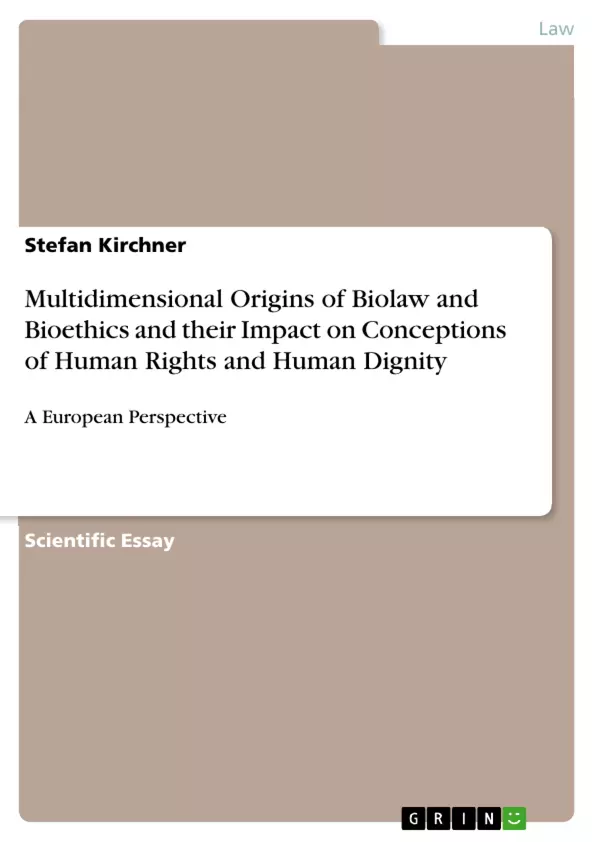Biolaw is a new legal discipline. Still closely related to the fundamentals on which law is built, such as philosophy, biolaw has evolved into a truly legal discipline. At the same time has it been recognized that biolaw has multiple sources and the recent emergence of the discipline makes these sources still relatively visible. This visibility might limit the acceptance of biolaw and in this article it will be attempted to pay attention to some of the issues which follow from the fact that biolaw is based on multiple sources. Particular attention will be given to one aspect which might be most controversial from a political perspective: the continued role of religion — and in particular Christian religion — in shaping thinking about biolaw also in secular societies.
Inhaltsverzeichnis (Table of Contents)
- I. Introduction
- II. Religious values in contemporary Europe
- 1. The Role of Faith in Law-Making and the continuing Culture War
- 2. Biolaw and Bioethics...
- III. Right to Life
- IV. Why Religion Can Matter for Legal Discourse
- V. Concluding Remarks
Zielsetzung und Themenschwerpunkte (Objectives and Key Themes)
This article aims to highlight the multidimensional origins of Biolaw and explore its impact on conceptions of human rights and human dignity. The focus is on the ongoing role of religion, particularly Christianity, in shaping the legal landscape, even in secular societies. The article also explores the relationship between Biolaw, human rights, and the European Convention on Human Rights, particularly in the context of the ongoing cultural war between faith and the state.
- The multifaceted origins of Biolaw and its relationship to philosophy and human rights
- The role of religion, especially Christianity, in shaping Biolaw and its implications for secular societies
- The impact of the European Convention on Human Rights and other international human rights documents on domestic legal frameworks
- The ongoing "culture war" between faith and the state and its relevance for human rights interpretations
- The importance of protecting the non-relativistic core of human rights in a world marked by increasing moral relativism
Zusammenfassung der Kapitel (Chapter Summaries)
- Introduction: This chapter introduces Biolaw as a new legal discipline closely connected to core questions of human identity and rights, particularly in the realm of philosophy. It emphasizes the need for a holistic understanding of law beyond specific disciplines, particularly in human rights law, due to the wide range of situations and perspectives involved.
- Religious values in contemporary Europe: This chapter explores the ongoing relevance of religious faith, especially Christianity, in shaping legal systems in a Europe characterized by both secular trends and strong Christian roots. The chapter touches on the concept of state neutrality and its implications for religion.
- The Role of Faith in Law-Making and the continuing Culture War: This chapter examines the ongoing cultural war between faith and the state, arguing that it has become a global conflict. It highlights the importance of a non-relativistic core to human rights and discusses the disconnect between the general populace and the values underlying Western European societies.
Schlüsselwörter (Keywords)
The key terms and concepts explored in this article include Biolaw, Christianity, European Convention on Human Rights, human rights, human dignity, religious values, secularism, culture war, moral relativism, and the non-relativistic core of human rights. The article examines the intersection of these themes in the context of contemporary European legal discourse, with particular attention to the ongoing role of religion in shaping legal thinking about bioethics and human rights.
Frequently Asked Questions
What is Biolaw?
Biolaw is a relatively new legal discipline that addresses issues at the intersection of law, biology, and medicine, often dealing with human identity and fundamental rights.
How does religion influence Biolaw in secular societies?
Despite secularization, religious values—particularly Christian ones—continue to play a significant role in shaping legal thinking about bioethics and human dignity in Europe.
What is the "culture war" mentioned in the article?
It refers to the ongoing conflict between faith-based values and state-driven secularism regarding the interpretation of human rights and bioethical regulations.
What is the role of the European Convention on Human Rights in Biolaw?
The Convention provides a framework for protecting human rights, such as the right to life, which Biolaw must interpret in the context of modern biotechnological developments.
Why is moral relativism a concern for human rights?
The article argues that increasing moral relativism can undermine the "non-relativistic core" of human rights, making it harder to maintain universal standards for human dignity.
- Quote paper
- Dr. Stefan Kirchner (Author), 2011, Multidimensional Origins of Biolaw and Bioethics and their Impact on Conceptions of Human Rights and Human Dignity, Munich, GRIN Verlag, https://www.grin.com/document/294897



